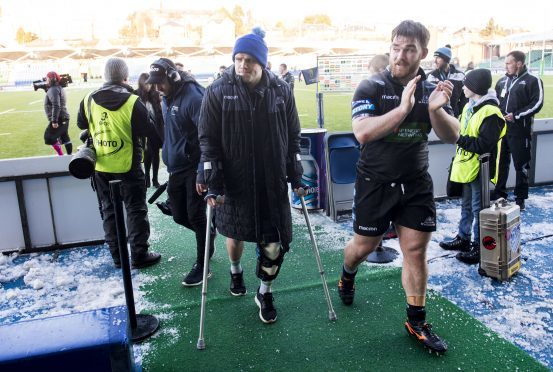Scotland’s Six Nations front row crisis deepened yesterday but forwards coach Dan McFarland thinks they’ll ride the losses of key personnel again.
George Turner is almost certainly out of the entire championship after a medial ligament knee injury suffered during Glasgow’s game with Exeter at the weekend, with his recovery is estimated at eight weeks.
With Fraser Brown out indefinitely for concussion examinations and Ross Ford definitely missing the championship with a pectoral injury, Edinburgh’s uncapped veteran Neil Cochrane was called up to the squad yesterday, and it seems 36-year-old Scott Lawson will be playing four years on from his last cap.
As well as the hookers, the Scots are already missing as many of six front-line props due to injury and suspension for the championship opener against Wales in Cardiff on February 3, but McFarland pointed to the success of the stopgap solutions during the Autumn Tests.
“I’m an expert on (front row injuries) now,” he joked. “It’s the same situation as it was in November.
“It’s really unfortunate for guys who can’t play for their country because they’re injured. For others it’s a great opportunity. As we know from November, guys stepped in who people hadn’t even heard of before and played some fantastic rugby.
“This just gives a huge opportunity for other fellas. That’s great, I love that.”
Having to slot in new personnel is “just the way it is” in the modern game, he continued.
“When I coached at Glasgow I was forever interchanging people,” he said. “Internationals go away, some guys get injuries and you have to bring other guys in. It’s forever changing.
“I read the newspapers (glad somebody does!!) and see Wales have a few injury worries, but every team does. “It doesn’t change that we have a team to prepare and must prepare a good, positive atmosphere. This is a big opportunity for everybody. You would be having heart attacks if you were worrying about players getting hurt.
“Having said that when somebody rang to tell me Zander (Fagerson) had dropped a bench on his foot i was not jumping around and talking about opportunity then!”
It will be more difficult because the Scots won’t be able to revert to club combinations quite as readily as they did in November, he conceded.
“Cohesion is a big thing for us but it can be built in a number of ways,” he said. “One is the club combinations which we can do at various points on the park. But another is by training together and the way we plan, spending a bit more time getting used to those combinations.”
Scotland won’t be letting up for fear of further injury problems during this week’s three-day training camp or when the squad finally regather for the championship next week, he added.
“It’s just not in our mentality,” he said. “We have to be out there training hard, doing well. The idea that we can just put a bunch of bodies together and win a 6 Nations game is not realistic.
“If we don’t get our training and preparation right, ideally spot on, we will not be competitive for five games. You can adapt in a certain way but there’s a stage where you have to say ‘we’ve still got to do this’, or you’re not going to win anyway.”
There are two other issues from the weekend for the Scots, with Richie Gray staying in France with a calf issue and Alex Dunbar in Glasgow as he goes through concussion protocols after taking a head knock on Saturday. Both are expected to rejoin the party before next week although Gray is not expected to play for Toulouse at the weekend.
Greig Laidlaw, on the other hand, looked sharp after his return to playing as a replacement for club Clermont-Auvergne at the weekend, said McFarland.
“Greig was really happy to get on the pitch even for that short period,” added the coach. “He had a couple of kicks at goal and felt the atmosphere of being back on the pitch.
“I can’t think Greig’s fitness is ever going to be an issue. He is a very focused fella, he won’t let anything drop off and the specialist has given him the all clear.”


